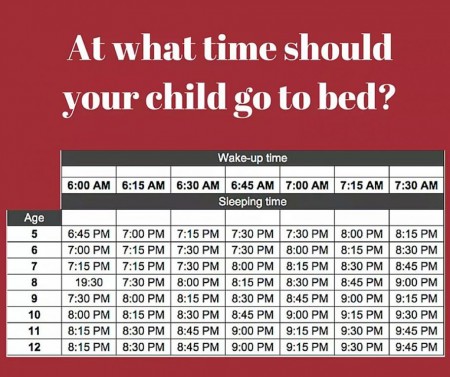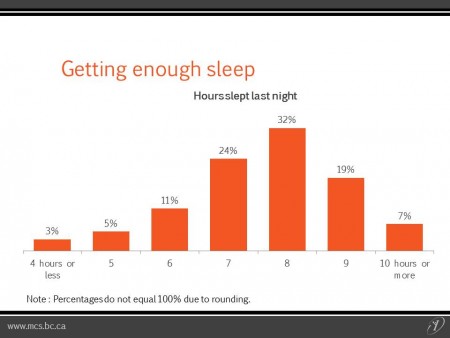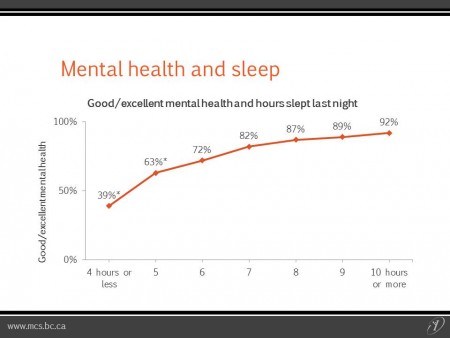Performance, health and adequate sleep
December 16, 2015 - 6 minutes readBy Chris Kennedy, Superintendent of Schools
With visions of sugarplums dancing in heads, getting enough sleep can be tricky for young people at this time of year. While the holidays bring extra challenges for busy families, lack of proper rest is something that has been trending in a negative direction year-round, and it has some potentially serious problems for youth.
An image shared on the Facebook page from Wilson Elementary School in Kenosha, Wisconsin this past fall went viral and was shared thousands of times:

While the information aligns with widely recommended guidelines for sleep, it is increasingly difficult for families to meet these guidelines. Today’s parents often work late into the evening, and children tend to participate more in out-of-school activities, while balancing responsibility for homework.
I was reminded of the sleep dilemma this past week listening to North Shore Medical Health Officer Mark Lysyshyn. In his presentation What You Need to Know About the Health of Students, so much of it kept coming back to sleep. Issues like physical activity, mental health and safety are all important, but the lack of sleep was pronounced. Two particular slides from the 2013 BC Adolescent Health Survey emphasized the challenge.
In the survey of local 13-18 year olds, almost 20% of them were getting 6 hours of sleep or less:

What was particularly disturbing about this was the direct link between those reporting low hours of sleep and mental health challenges:

The discussion with parents that followed this session was interesting: The community data also indicated the need for students to be getting exercise and participating in sports. Many raised the fact that participation in organized sports that often cut into sleep time – really a no-win situation. We want our kids to be active and to get 8 or 9 hours of sleep – but soccer practices can go to 9 pm and school often starts by just after 8 am. Of course, there is also persuasive data that indicates later start-times for school would be helpful, but very few jurisdictions have built this into the system. Clearly, we have structures in our lives that make it hard to adhere to the recommendations.
Media have been regular reporters of this – including this comprehensive story from Global News this fall.
There are many lists circulating the internet on tips for young people and sleep like this one from Canadian Pediatricians:
Have a relaxing bedtime routine. Have a light snack (such as a glass of milk) before bed. Try to go to bed at about the same time every night. Keep your room cool, dark and quiet but open the curtains or turn on the lights as soon as you get up in the morning.
Always fall asleep in your bed. Use your bed for sleeping only. Avoid doing homework, using a computer or watching TV while in your bed. Try to be in your bed with the lights out for at least 8 hours every night.
Napping during the day can make it difficult to fall asleep. If you want to nap, keep it short (less than 30 min). Definitely don’t nap after dinner.
Get exercise every day, but avoid very hard exercise in the evening.
Avoid caffeine (coffee, tea and sodas) after mid-afternoon. Don’t use any products to help you sleep such as alcohol, herbal products or over-the-counter sleep aids.
Limit screen time before bed. Using electronic media and being exposed to the screen’s light before trying to sleep can make it harder to fall asleep.
On weekends, no matter how late you go to bed, try to get up within 2 hours to 4 hours of your usual wake time. This is especially important if you have trouble falling asleep on Sunday nights.
Make sure you are not trying to do too much. Do you still have some time for fun and to get enough sleep? If you are having trouble sleeping because you have too much on your mind, try keeping a diary or to-do lists. If you write things down before sleep, you may feel less worried or stressed.
There seems to be more and more research around the importance of sleep, covering everything from athletic performance to academic performance and letter grades in school. It’s an issue that seems so simple, but the solutions can be hard to implement. That said, it is important to be constantly reminded that poor sleep has more negative consequences than just feeling tired the next day, and this research provides excellent reminders for parents and educators.
Wishing you all a restful and joyful time with your families this holiday season,
Chris Kennedy
Superintendent of Schools